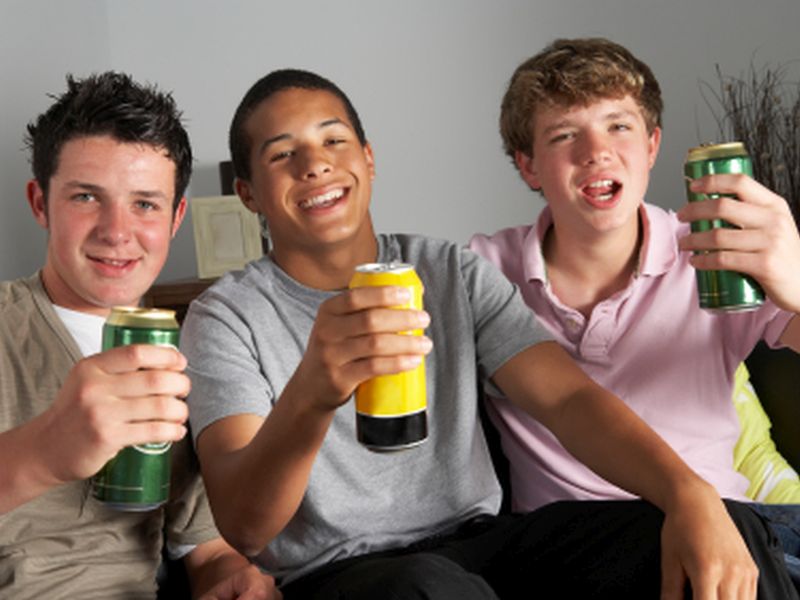 By Steven Reinberg
By Steven Reinberg
HealthDay Reporter
WEDNESDAY, Aug. 29, 2018 (HealthDay News) — Teen boys who drink may raise their risk for aggressive prostate cancer decades later, a preliminary study suggests.
Compared to non-drinkers, men who reported having at least one alcoholic drink a day between ages 15 and 19 had more than triple the odds of developing aggressive prostate cancer in adulthood, the researchers said.
The study doesn’t prove that alcohol use is to blame. But the researchers said it may be a marker of other risky behaviors, such as heavy drinking in adulthood.
“We are still at the point where there isn’t really convincing evidence linking alcohol and prostate cancer risk. But potentially, there could be a role for alcohol early in life,” said study senior researcher Emma Allott.
She hopes this study will prompt others to look at prostate cancer risk factors over a man’s lifetime, rather than focusing only on adulthood. Allott is an assistant professor of nutrition at the University of North Carolina’s Gillings School of Global Public Health.
Because the prostate grows quickly during adolescence, it may be more vulnerable to cancer-causing agents during the teen years, Allott suggested.
But, she reiterated, “At this stage, based on this study alone, we can’t say anything conclusive about alcohol and prostate cancer.”
For the study, Allott’s team collected data on 650 men who had biopsies to look for prostate cancer at a veterans’ hospital in Durham, N.C., between 2007 and 2018.
The men ranged in age from 49 to 89 and had no history of prostate cancer. They completed questionnaires that asked how many alcoholic drinks a week they had consumed during each decade of life.
Though heavy drinking during adolescence did not predict an increased risk for prostate cancer, moderate drinking did. Men who reported consuming at least seven alcoholic drinks a week as teens had 3.2 times the odds for aggressive cancer compared to those who didn’t drink, the findings showed.
The same link was found among 20- to 49-year-olds who were moderate drinkers. Their increased risk was three to four times higher than that of non-drinkers, the researchers reported.
Moreover, Allott’s group found that men who drank the most over their lifetime also had more than triple the odds for aggressive prostate cancer, compared with teetotalers.
The findings have several limitations, the study authors acknowledged. For one thing, the researchers relied on participants’ memory of how much they drank as teens. And behaviors such as smoking may also skew the findings. Finally, the number of participants could be too small to tease out other reasons for the study results.
The study also doesn’t account for the effect of heavy drinking that began in adolescence and continued, the researchers said.
Dr. Anthony D’Amico is a professor of radiation oncology at Harvard Medical School in Boston. He said this study cannot make a definitive claim that drinking causes prostate cancer, because it wasn’t a randomized trial comparing drinking against non-drinking.
“You can’t show for certain that alcohol use causes high-grade prostate cancer,” he said. “There can be other factors that weren’t accounted for that can be associated with high-grade prostate cancer.”
These factors include use of the drug finasteride (Proscar), which shrinks the prostate and has been linked to a small increased risk for cancer. It also isn’t clear if participants had been screened for prostate cancer. Not screening can increase the odds that prostate cancer will be advanced when it’s first found, D’Amico said.
“There may be something there. But I don’t want people to think it’s a slam dunk and causality is proved,” D’Amico said.
The report was published Aug. 23 in the journal Cancer Prevention Research.

Copyright © 2018 HealthDay. All rights reserved.
CONTINUE SCROLLING FOR NEXT NEWS ARTICLE
SOURCES: Emma Allott, Ph.D., research assistant professor of nutrition, Gillings School of Global Public Health, University of North Carolina, Chapel Hill; Anthony D’Amico, M.D., Ph.D., professor of radiation oncology, Harvard Medical School, Boston; Aug. 23, 2018, Cancer Prevention Research






Leave a Reply